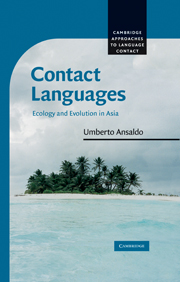Book contents
- Frontmatter
- Contents
- List of maps
- List of tables and figures
- Series editor's foreword
- Acknowledgements
- List of abbreviations
- 1 Introduction
- 2 The ecology of Monsoon Asia
- 3 Linguistic ecologies of Southeast Asia
- 4 Methodological issues in the study of contact languages
- 5 Contact language formation in evolutionary theory
- 6 Congruence and frequency in Sri Lanka Malay
- 7 Identity alignment in Malay and Asian-Portuguese Diaspora
- 8 Pidgin ecologies of the China coast
- 9 Implications, conclusions, and new horizons
- References
- Index
4 - Methodological issues in the study of contact languages
Published online by Cambridge University Press: 18 January 2010
- Frontmatter
- Contents
- List of maps
- List of tables and figures
- Series editor's foreword
- Acknowledgements
- List of abbreviations
- 1 Introduction
- 2 The ecology of Monsoon Asia
- 3 Linguistic ecologies of Southeast Asia
- 4 Methodological issues in the study of contact languages
- 5 Contact language formation in evolutionary theory
- 6 Congruence and frequency in Sri Lanka Malay
- 7 Identity alignment in Malay and Asian-Portuguese Diaspora
- 8 Pidgin ecologies of the China coast
- 9 Implications, conclusions, and new horizons
- References
- Index
Summary
The consistency condition which demands that new hypotheses agree with accepted theories is unreasonable because it preserves the older theory, and not the better theory. Hypotheses contradicting well-confirmed theories give us evidence that cannot be obtained in any other way. Proliferation of theories is beneficial for science, while uniformity impairs its critical power. Uniformity also endangers the free development of the individual.
Paul Feyerabend (1975 : 36)What is a theory of something? What does a theory aim to do? The word theory comes from Greek and originally meant something like a way to look at things, a point of view. A theory is basically an idea, usually centred within one specific worldview, or a philosophical idea, about the nature of a given aspect of the world. Depending on the basic ideas that we bring into the experience of any event, we influence and, to some extent, limit, or narrow down, our field of enquiry. Humans are naturally curious and like to hypothesize about the world. Most academics believe that creating hypotheses and testing them can further our understanding of the world we inhabit. This is in itself already only relatively true; it holds within one specific worldview, the ‘scientific method’, influenced by Western philosophy since the time of Socrates. In Buddhist philosophy, for example, rational enquiry reveals nothing about the true nature of existence because it can only touch on superficial, illusionary aspects of reality. Real knowledge in Buddhism can only come through introspective meditation (and in Greek, ‘theory’ could indeed also refer to ‘contemplation’).
- Type
- Chapter
- Information
- Contact LanguagesEcology and Evolution in Asia, pp. 81 - 98Publisher: Cambridge University PressPrint publication year: 2009

